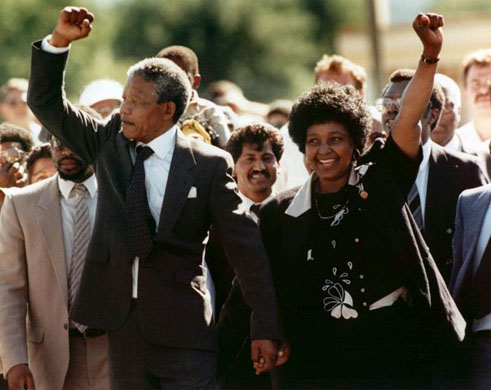
Why Inequality is Prevalent in South Africa

The BBC recently conducted in depth interviews with different stakeholders about the reasons for inequality in South Africa. These insightful interviews offer a glimpse into issues that South Africa is facing and the roots of those problems. Some blame the education system, the ANC, the struggle for independence and even corruption.
However, another viewpoint shows that there were fundamental problems created through decisions made in trying to broker independence. It is refreshing to hear about the role of big business, IMF and World Bank in shaping the current South African economy because too often people brush over the influential role of these organizations.
After many years of colonialism, many African leaders made huge compromises that still haunt their countries today. What happened to South Africa also happened to Zimbabwe at the Lancaster House agreement. While we don’t want to just blame our liberation heroes for the choices they made to make us free, we want them to be transparent about those faulty decision so that new and better decision can be made.
This brief but insightful podcast offers a rare glimpse into the myriad of problems that Africans governments face. While trying to please the local people they also have to please foreign entities like the IMF, World Bank etc so they can receive the funds needed to fund healthcare and education projects. However, these organizations use capitalist models that encourage private sector growth and reduction in government spending. Reducing government spending is often something that most African government cannot afford because of inferior access to healthcare and education that was perpetuated by colonial governments. While South Africa faces many of the same problems that most African governments have to deal with, there is always hope that changes can be made to make Africans more prosperous. I believe change is coming but only when citizens begin to ask questions and demand higher standards from their leaders rather than idolize them because helped to fight apartheid.




10 Comments
by Sam
There is nothing wrong with encouraging private sector growth. When people have opportunities to start businesses without government nepotism, prosperity happens for example strive Masiyiwa in zimbabwe. Get African governments out of the way and let the entrepreneural spirit of africans to florish
by gordon
We cannot ignore the cultural legacies of colonialism. It is a fallacy to believe entrepreneurship will solve all problems. This is a structural problem. Its a policy issue. Bad advice reaps high unemployment & income inequality.
by SamChiko
Getting government out of the way is the reason why South Africans are in this horrible state. There is a place for government.
by bhakiti
Laissez-faire capitalism doesn’t work.Ask Bush whose policies of no government led to GREAT RECESSION.
by afrogal
this professor provides great insight. South Africa’s independence was led by the elite/ talented tenth the educated types / academic or their children in the case of Thabo Mbeki who were taught to embrace the models of the IMF & World Bank. These models such as service industries are for mature economies such as western economies because they require highly skilled workers. into the comparison between Brazil and SA economic models is certainly eye opening and it is evident that Brazil will rule the future because of its focus on creating jobs for everyone. South Africa perceived itself ‘better’ than other African countries and wanted to be known as the economic hub of Africa however they neglected to understand basic fundamentals like Maslows hierarchy of needs.
by noku nxumalo
it always amazes me how westerners in particular right wing politicians always focus on every other strategy rather than employment focused strategy which Brazil used to become the powerhouse that she is today. It is true that in poor countries jobs are needed for all basically skilled and unskilled jobs because that is where the people are? Lack of jobs causes civil unrest and disturbs the peace. I believe in capitalism because it works in China, America, Europe and now Brazil . Western capitalism itself is not pure capitalism because it has social program that act as a safety net for the poor but when they come to Africa they try to tell Africans to get rid of social programs.
by nomsa bhebe
South africa & zimbabwe the last countries to become independent on the continent did not win their liberation struggles so they started to negotiate from a point of weakness &it was downhill from then on out.
by SamChiko
This is very enlightening. So how do we come out of this conundrum that our leaders put us in. We wouldn’t want South Africa to have to go down the same road that Zimbabwe did because it is much harder to try and dig out than to just do the right thing from the beginning
by paraffin
Well South Africa must put employment creation as priority. Soweto & all townships need hope. Brazil provides a working model so no need to reinvent wheel
by Ashanti Princess
South Africans are not students of history so they will go down the path of Zimbabwe and every other post colonial country.
Comments are closed.